152 start with D start with D
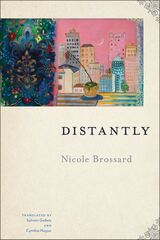
This bilingual edition of Nicole Brossard’s lyrical poetry is a sequence of lush, taut cityscapes. Known for her elliptical and materially grounded poetics, Brossard creates an intimate series of poems drawn loosely from urban experience. The poems comprise an evocative distillation of postmodern urban life with a sharp sense of cultural and gendered histories of violence and beauty and struggles for survival and intimacy. The poems capture the emotional and ecological surroundings of each city and its people. The cities in Brossard’s poems feel surreal and in them dwell survivors of “misfortunes,” living in urban landscapes with their “gleaming debris” and “bridges, ghats, / rivers in a time of peace and torture.” These poems gesture toward a transmuted social context and toward a quest “to meet the horizon the day after the horizon.”



At once relishing and resisting the poetic traditions of formal English verse, Diva showcases Campo moving deftly between received forms and free verse. In each poem the sound of words is transformed into the highest of arts, the act of performance into the exercise of power, and the most profound abjection into the sweet promise of divinity. Culminating with his new and daring translations of Federico García Lorca's sonetos—the great Spanish poet's most homoerotically explicit and formally accomplished poems—Campo's music instills in the reader an exalted understanding of beauty, suffering, and, ultimately, the human capacity for empathy.
From reviews of Campo's previous poetry:
“Extraordinary meditations on illness and the healing power of words.”—Lambda Literary Foundation
“Read Campo to enter the bloodstream of a man who, with a haunting clarity of vision, shares his memories, his anguish, his healing love.”—Cortney Davis, Literature and Medicine
“Riveting, provocative, and refreshing—[this volume] is a gift to the clinician who is trying to re-invoke in his or her students the humility, compassion, and deep caring that brought us all into medicine in the first place.”—Dr. Sandra L. Bertman, Annals of Internal Medicine
“[Campo] listens to the sounds the body makes, but what he hears is poetry.”—Zoë Ingalls, Chronicle of Higher Education
“Powerful and accessible.”—Jonathan Jackson, Washington Blade
“Bemused, indelible, and heartbreaking.”—Marilyn Hacker, Out
“[Campo’s] private corral of disparate words twist, torque, collide with gorgeous creative imperative.”—Nomi Eve, Independent Weekly
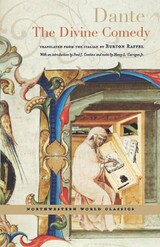
At the midpoint of his life, during Holy Week in 1300, Dante awakes to himself in the middle of a forest so dark that the sun’s light cannot penetrate its gloom. of the wildness and brutality of the woods, Dante cries out for help, and thus begins one of Western literature’s greatest epic journeys.
The Divine Comedy follows Dante the pilgrim—guided by the great Roman poet Virgil, then by the love of his life, Beatrice—as he travels downward through Hell, then upward through Purgatory in order to reach Paradise and witness the love that moves the sun and the stars. Raffel’s translation vividly captures the divine contrapasso, the ultimate case of the punishment the crime, in the Inferno, while fathoming the complexity of the Purgatorio and the ecstasy of the Paradiso.
One of the world’s greatest works of literature, Dante’s Commedia revolutionized poetry and the Italian language. This epic poem was the to be written in the vernacular of the Italian people rather than in Latin. In it, Dante weaves the best of classical literature from Virgil, Statius, Aristotle, and Ovid with staples from the Christian tradition (including the Scriptures, Augustine, and Aquinas), into a colorful medieval tapestry that depicts at once the vividly checkered history of church and empire.
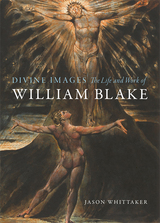

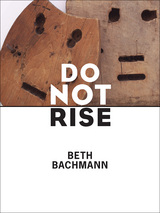
—Robert Hass

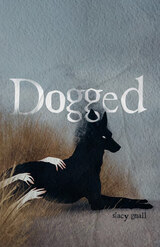
Looking to a wide range of high and low visual media, from Steven Spielberg’s Jaws and Animal Planet’s Fatal Attractions to Peter Paul Rubens’s painting of Hercules’s dog discovering Tyrian purple, Stacy Gnall ponders human-animal connections and divisions, exploring those moments when human voices blend with “silent” beasts to exceed the limits of language. In Dogged, animals emerge as the highest aspiration of poetry.
Around the bend it was reckoned
we would never grow old
because there were no words for it.
I placed my arms soft
around the neck of a fawn
and she felt no alarm. Speech
is where we went wrong.
(From “The Wood in Which Things Have No Name”)

In Dogged Hearts Ellen Doré Watson demonstrates a capacious talent for invention and empathy and, with her incomparable linguistic brio, gives us an unforgettable look at how loss and disconnection can usher in chance-to-change reverie and unexpected veerings towards life.
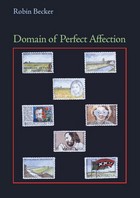


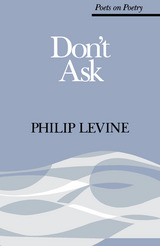
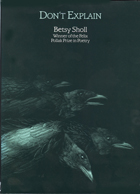
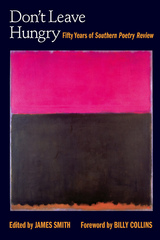
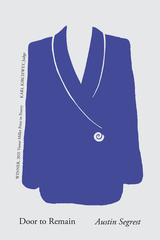
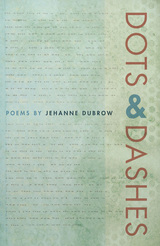
As in the poet’s earlier collection, Stateside, the poems in Dots & Dashes are explicitly feminist, exploring the experiences of women whose husbands are deployed. But, while Stateside looked to masculine stories of war, Dots & Dashes incorporates the views and voices of female poets who have written about combat. Looking to Sappho and Emily Dickinson, the poet considers how the act of writing allows her autonomy and agency rarely granted to military spouses, even in the twenty-first century. Dubrow catalogs the domestic life of a military spouse, illustrating what it is like to live in a tightly constructed world of rules and regulations, ceremony and tradition, where “every sacrifice already / knows its place.”
Navigating the rough seas of marriage alongside questions about how civilians and those in the military can learn to communicate with one another, Dubrow argues for compassion and empathy on both sides. In this timely collection, Dubrow offers the hope that if we can break apart our preconceptions and stereotypes, we can find what connects all of us.
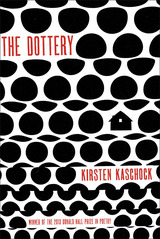
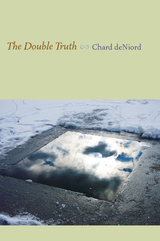
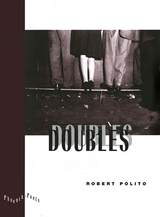
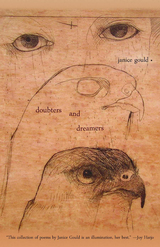
In the first half of the book, “Tribal History,” Gould ingeniously repurposes the sonnet form to preserve the stories of her mother and aunt, who grew up when “muleback was the customary mode / of transport” and the “spirit world was present”—stories of “old ways” and places claimed in memory but lost in time. Elsewhere, she remembers her mother’s “ferocious, upright anger” and her unexpected tenderness (“Like a miracle, I was still her child”), culminating in the profound expression of loss that is the poem “Our Mother’s Death.”
In the second half of the book, “It Was Raining,” Gould tells of the years of lonely self-making and “unfulfilled dreams” as she comes to terms with what she has been told are her “crazy longings” as a lesbian: “It’s been hammered into me / that I’ll be spurned / by a ‘real woman,’ / the only kind I like.” The writing here commemorates old loves and relationships in language that mingles hope and despair, doubt and devotion, veering at times into dreamlike moments of consciousness. One poem and vignette at a time, Doubters and Dreamers explores what it means to be a mixed-blood Native American who grew up urban, lesbian, and middle class in the West.
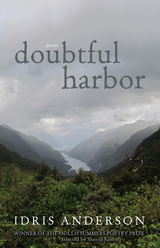
In Doubtful Harbor, Idris Anderson turns wandering into art. From large landscapes to the minutest details, she seeks with each poem to convey the world more clearly, acutely, and exquisitely. As she meditates on indelible moments with intimate others, friends, and strangers, she teases from these encounters their elusive connections and disconnections. As Sherod Santos wrote when selecting the book for the Hollis Summers Poetry Prize, “These are not the journeys of a tourist, but of a wandering solitaire whose purpose is not to maintain a travelogue, but to lose herself in the otherness of her surroundings.”
Doubt is itself a driving force here, an engine of both questing and questioning. As exact as Anderson’s eye is, her poems draw energy from ambiguity as she renders interior and exterior landscapes—foreign and domestic, lovely and littered, familiar and strange.
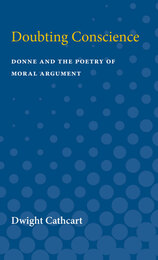
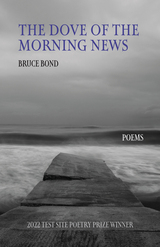
As a lens into contemporary life, the title sequence interrogates the vision of Pierre Teilhard de Chardin, whose sense of our increasingly interwoven cultural conversation figures now as a premonition of the internet. If his hope for the noosphere as a fulfillment of divine promise feels problematic, it nonetheless sees our globe as an organism whose long-term survival depends on the capacity of each to forge friendship across difference, to take the health and integration of the individual as emblematic of the whole.
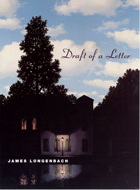
From Second Draft:
What other people learn
From birth,
Betrayal,
I learned late.
My soul perched
On an olive branch
Combing itself,
Waving its plumes. I said
Being mortal,
I aspire to
Mortal things.
I need you,
Said my soul,
If you’re telling the truth.
Draft of a Letter is a book about belief—not belief in the unknowable but belief in what seems bewilderingly plain. Pondering the bodies we inhabit, the words we speak, these poems discover infinitude in the most familiar places. The revelation is disorienting and, as a result, these poems talk to themselves, revise themselves, fashioning a dialogue between self and soul that opens outward to include other voices, lovers, children, angels, and ghosts. For James Longenbach, great distance makes the messages we send sweeter. To be divided from ourselves is never to be alone. “If the kingdom is in the sky,” says the body to the soul, “Birds will get there before you.” “In time,” says the awakening soul, “I liked my second / Body better / Than the first.” To live, these poems insist, is to arise every day to the strange magnificence of the people and places we thought we knew best. Draft of a Letter is an unsettled and radiant paradiso, imagined in the death-shadowed, birth-haunted middle of a long life.
Praise for Fleet River
“A sensibility this cogent, this subtle and austere is rare; even rarer is its proof that poetry still flows through all things and transforms all things in the process.”—Carol Muske-Dukes, Los Angeles Times Book Review
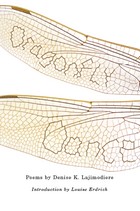
Dragonfly Dance is a collection of poems remarkable for their candor and sense of catharsis. Writing from the vantage point of an American Indian women, Denise Lajimodiere opens a door into the lives of Native girls and women. Her poems often reflect the deep tensions between Native culture and white culture.
Reflected in Lajimodiere's poems, life is sometimes beautiful but rarely easy. "The Necklace," the narrator details how her mother repaired a favorite beaded necklace, "her arthritic fingers patiently / threading beads / on the long thin needle, weaving / night after night." When the necklace is finally repaired, she wears it to school where
At recess a White boy
ran by, yanked
it off my neck and threw it.
I watched as it ascended
high above the blacktop,
the beads glittered, scattering their light,
a rainbow against gray skies.
Unadorned, direct, and often raw, these riveting poems sear their way into our imaginations, inviting us into a world we might never have known. We are richer for the knowledge.


Leonora Bernardi (1559–1616), a gentlewoman of Lucca, was a highly regarded poet, dramatist, and singer. She was active in the brilliant courts of Ferrara and Florence at a time when creative women enjoyed exceptional visibility in Italy. Like many such figures, she has since suffered historical neglect. Drama, Poetry and Music in Late-Renaissance Italy presents the first-ever study of Bernardi’s life along with a modern edition of her recently discovered literary corpus, which mostly exists in manuscripts. Her writings are presented in the original Italian with new English translations, scholarly notes, and critical essays. Based on new archival research, the substantial opening section reconstructs Bernardi’s unusually colorful life. The second major section presents her pastoral tragicomedy Clorilli, one of the earliest secular dramatic works by a woman. The third section presents Bernardi’s secular and religious verse, which engaged with new trends in lyric and poetry for music, and was set by various key composers across Italy. The volume thus firmly positions Leonora Bernardi as a distinctive voice and dynamic player in the extraordinarily rich social, cultural, and geo-political networks of late-Renaissance Italy.
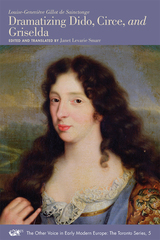
—Perry Gethner
Norris Professor of French, Oklahoma State University

Through an examination of the violence, musicality, and revolution of his poetry, David Austin brings Johnson’s cultural and philosophical influences alive. Encompassing reggae music, the Bible, Rastafari, and surrealism, socialism, and feminism, as well as the radical politics of Aimé Césaire, John La Rose, Frantz Fanon, C. L. R. James, and W. E. B. Du Bois, Johnson’s poetry reveals itself as an important site of diaspora politics and struggle.
Probing the juncture at which Johnson’s poetry meets his politics, Dread Poetry and Freedom shows the significant role art can play in bringing about social change in times of dread.
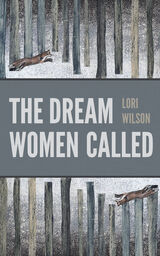
This book is about crossing into a new version of your own story—after a marriage ends, the parents die, the children are grown, or the faith is discarded—and finding a place to stand, a new way to take up space in the world. Uniting past and present, these poems create multifaceted portraits, particularly of relationships between mothers and daughters. Wilson’s poems sift through memory, dreams, art, imagination, nature, and close observation, turning each discovery over in order to see it fully. Beneath the fine-grained imagery of these lyric excavations are the sometimes opposing but fundamental desires to be whole and to be seen, which often means looking within as well as turning toward the world outside. The speaker is listening always for the dream women who call, for whatever may beckon from the present and future, preparing her in some way for a life that’s truly hers.

This book is about crossing into a new version of your own story—after a marriage ends, the parents die, the children are grown, or the faith is discarded—and finding a place to stand, a new way to take up space in the world. Uniting past and present, these poems create multifaceted portraits, particularly of relationships between mothers and daughters. Wilson’s poems sift through memory, dreams, art, imagination, nature, and close observation, turning each discovery over in order to see it fully. Beneath the fine-grained imagery of these lyric excavations are the sometimes opposing but fundamental desires to be whole and to be seen, which often means looking within as well as turning toward the world outside. The speaker is listening always for the dream women who call, for whatever may beckon from the present and future, preparing her in some way for a life that’s truly hers.
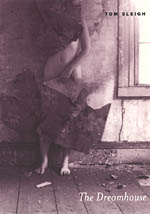
Praise for Tom Sleigh:
"Through sheer artistry, Tom Sleigh manages to write . . . in a transcendent way, and without appeal to the metaphysical assumptions transcendence usually requires. The Chain . . . floods darkness with brilliant craft."—Gray Jacobik, Boston Globe
"Tom Sleigh's second book of poems, Waking, is so fine one can hardly do justice to it in a review. . . . Sleigh is nearly as prodigal with his gifts as Yeats."—Liz Rosenberg, New York Times Book Review
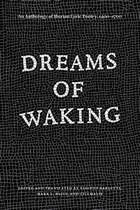
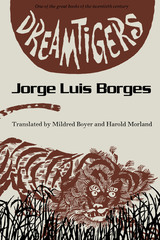
Dreamtigers has been heralded as one of the literary masterpieces of the twentieth century by Mortimer J. Adler, editor of Great Books of the Western World. It has been acknowledged by its author as his most personal work. Composed of poems, parables, and stories, sketches and apocryphal quotations, Dreamtigers at first glance appears to be a sampler—albeit a dazzling one—of the master's work. Upon closer examination, however, the reader discovers the book to be a subtly and organically unified self-revelation.
Dreamtigers explores the mysterious territory that lies between the dreams of the creative artist and the "real" world. The central vision of the work is that of a recluse in the "enveloping serenity " of a library, looking ahead to the time when he will have disappeared but in the timeless world of his books will continue his dialogue with the immortals of the past — Homer, Don Quixote, Shakespeare. Like Homer, the maker of these dreams is afflicted with failing sight. Still, he dreams of tigers real and imagined and reflects upon of a life that, above all, has been intensely introspective, a life of calm self-possession and absorption in the world of the imagination. At the same time he is keenly aware of that other Borges, the public figure about whom he reads with mixed emotions: "It's the other one, it's Borges, that things happen to."

What drives literary change? Does literature merely follow shifts in a culture, or does it play a distinctive role in shaping emergent trends? Michael Fuller explores these questions while examining the changes in Chinese shi poetry from the late Northern Song dynasty (960–1127) to the end of the Southern Song (1127–1279), a period of profound social and cultural transformation.
Shi poetry written in response to events was the dominant literary genre in Song dynasty China, serving as a central form through which literati explored meaning in their encounters with the world. By the late Northern Song, however, old models for meaning were proving inadequate, and Daoxue (Neo-Confucianism) provided an increasingly attractive new ground for understanding the self and the world. Drifting among Rivers and Lakes traces the intertwining of the practice of poetry, writings on poetics, and the debates about Daoxue that led to the cultural synthesis of the final years of the Southern Song and set the pattern for Chinese society for the next six centuries. Examining the writings of major poets and Confucian thinkers of the period, Fuller discovers the slow evolution of a complementarity between poetry and Daoxue in which neither discourse was self-sufficient.
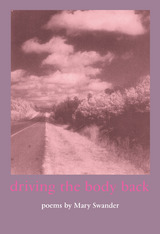
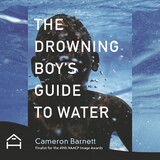
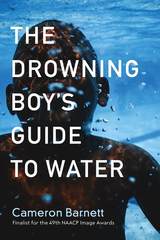

Gathers tales from the Southwestern United States and Northern Mexico to understand the relationship between people and place in a borderland
Landscape is the space of negotiation between human beings and the physical world, and rarely are the negotiations more complex and subtle than those conducted through the desert landscape along the Mexico-U.S. border.
Patricia L. Price views the shaping of the landscape on and around the border through various narratives that have sought to establish claims to these dry lands. Most prominent are the accounts of Anglo-American expansionism and Manifest Destiny juxtaposed with the Chicano nationalist tale of Aztlán in the twentieth century, all constituting collective, contending claims to the U.S. Southwest. Demonstrating how stories can become vehicles for changing places and identities, Price considers characters old and new who inhabit the contemporary borderlands between Mexico and the United States—ranging from longstanding manifestations of good and evil in the figures of the Virgin of Guadalupe and the Devil to a collection of lay saints embodying current concerns. Dry Place weaves together theoretical insights with field-based inquiry, autobiography, and creative writing to arrive at a textured understanding of the bordered landscape of late modern subjectivity.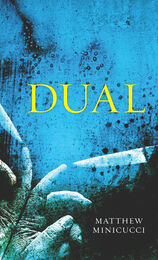
In his fourth poetry collection, Matthew Minicucci examines masculinity and gun violence as he brings to life the grammatical concept of the dual, a number that is neither singular nor plural. Though now lost in English, the concept is present in other languages both extant and ancient. The poems’ forms fittingly include the elegy, palinode, and contrapuntal, which is both a single poem and two poems intertwined. They align contemporary moments with key texts from Western literature, including ancient Greek epics, in a way that helps us reconsider the aggression of young men. “The world kills kind boys,” Minicucci writes, and “we bury the bodies inside men.”
Minicucci recategorizes our idea of “West,” the Western canon, and the Old West and its bullets, comparing them to modern-day landscapes in Utah, Oregon, Washington, California, and Hawai’i. Whether memorializing a woodworking grandfather or poets Brigit Pegeen Kelly and James Longenbach, Dual notes that loss has a double vision. While weighty in their subjects, Dual’s poems make room for unexpected moments of lightness, such as when the speaker compares the complications of love to “reading the Iliad and realizing, sure, there's anger, // but before that there’s just a lot of camping.”
The book argues, in the end, that there is an unalienable dual between the observer and the observed, the self and the self as confessed to another.
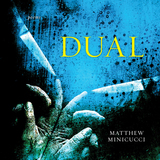
In his fourth poetry collection, Matthew Minicucci examines masculinity and gun violence as he brings to life the grammatical concept of the dual, a number that is neither singular nor plural. Though now lost in English, the concept is present in other languages both extant and ancient. The poems’ forms fittingly include the elegy, palinode, and contrapuntal, which is both a single poem and two poems intertwined. They align contemporary moments with key texts from Western literature, including ancient Greek epics, in a way that helps us reconsider the aggression of young men. “The world kills kind boys,” Minicucci writes, and “we bury the bodies inside men.”
Minicucci recategorizes our idea of “West,” the Western canon, and the Old West and its bullets, comparing them to modern-day landscapes in Utah, Oregon, Washington, California, and Hawai’i. Whether memorializing a woodworking grandfather or poets Brigit Pegeen Kelly and James Longenbach, Dual notes that loss has a double vision. While weighty in their subjects, Dual’s poems make room for unexpected moments of lightness, such as when the speaker compares the complications of love to “reading the Iliad and realizing, sure, there's anger, // but before that there’s just a lot of camping.”
The book argues, in the end, that there is an unalienable dual between the observer and the observed, the self and the self as confessed to another.
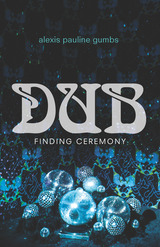
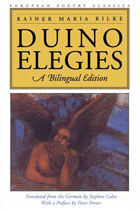
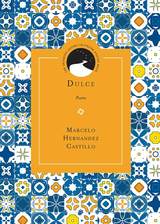
The poems in Dulce are at once confession and elegy that admit the speaker’s attempt and possible failure to reconcile intimacy toward another and toward the self. The collection asks: what’s the point in any of this?—meaning, what’s the use of longing beyond pleasure; what’s the use of looking for an origin if we already know the ending?
Surreal and deeply imagistic, the poems map a parallel between the landscape of the border and the landscape of sexuality. Marcelo Hernandez Castillo invites the reader to confront and challenge the distinctions of borders and categories, and in doing so, he obscures and negates such divisions. He allows for the possibility of an and in a world of either/or.
These poems enact a prescient anxiety of what is to come, “I want to say all of this is true / but we both know it isn’t. . . . We already know what’s at the other end of this.” Dulce is truly a lyrical force rife with the rich language of longing and regret that disturbs even the most serene quiet.
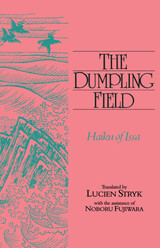
Koyashi Issa (1763–1827), long considered amoung Japan’s four greatest haiku poets (along with Basho, Buson, and Shiki) is probably the best loved. This collection of more than 360 haiku, arranged seasonally and many rendered into English for the first time, attempts to reveal the full range of the poet’s extraordinary life as if it were concentrated within a year. Issa’s haiku are traditionally structured, of seventeen syllables in the original, tonally unified and highly suggestive, yet they differ from those of fellow haikuists in a few important respects. Given his character, they had to. The poet never tries to hide his feelings, and again and again we find him grieving over the lot of the unfortunate – of any and all species.
No poet, of any time or culture, feels greater compassion for his life of creatures. No Buddhist-Issa was to become a monk—acts out the credos of his faith more genuinely. The poet, a devoted follower of Basho, traveled throughout the country, often doing the most menial work, seeking spiritual companionship and inspiration for the thousands of haiku he was to write. Yet his emotional and creative life was centered in his native place, Kashiwabara in the province of Shinano (now Nagano Prefecture), and his severest pain was the result of being denied a place in his dead father’s house by his stepmother and half brother.
By the time he was able to share the house of his beloved father, Issa had experienced more than most the grief of living, and much more was to follow with the death of his wife and their four children. In the face of all he continued to write, celebrating passionately the lives of all that shared the world with him, all creatures, all humans. Small wonder that Issa is so greatly loved by his fellow poets throughout the world, and by poetry lovers of all ages.

“These poems are stamped with an energetic and outgoing attentiveness to the world. This, so much more than just the humming examination of the self, is what makes writing a sacred thing. Who does this is a true poet, and few do it better than Patricia Fargnoli.”
— Mary Oliver
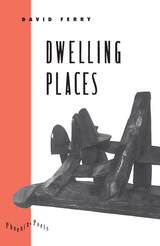
"David Ferry's Dwelling Places is a marvelous, extremely moving book, distinguished by Ferry's characteristic formal virtuosity, extraordinarily fresh and 'inner' translations, and a kind of driven anguished rage at both the social conditions in which human beings have to live and the mysteriously unchangeable tragedies of individual human lives. The translations amplify and deepen the contemporary scenes. I feel that in the future this will be perceived as a great book."—Frank Bidart
"Not until I had read Dwelling Places several times did I see how ingeniously resourceful, ambitious, and admirably modest a book David Ferry has made."—Boston Review
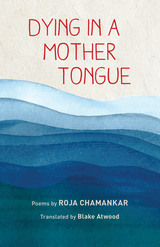
This collection of poetry by the celebrated southern Iranian poet and filmmaker Roja Chamankar (b. 1981) introduces English-speaking readers to one of the most accomplished and well-loved poets of her generation. Chamankar’s work blends surrealism and the southern coastal landscape of the poet’s upbringing with everyday experiences in rapidly urbanizing Tehran. While locating herself in the modernist tradition of Iranian poets like Forugh Farrokhzad and Ahmad Shamlu through form and imagery, Chamankar infuses this tradition with concerns unique to a generation that grew up in post-revolutionary Iran and endured the effects of the Iran-Iraq war. Seascapes, love and eroticism, the disconnection of modern life, and myths and fairytales figure prominently in these vivid, lyrical poems.
In the rich miniature worlds of Chamankar’s poetry, readers become privy to a range of experiences, from desire and pain to rage and humor. Sometimes abstract, other times surreal—Chamankar’s unique poetic voice, like the sea she returns to again and again, combines and sweeps these experiences to shore with assurance, strength, and beauty.
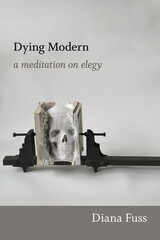
Focusing primarily on American and British poetry written during the past two centuries, Fuss maintains that poetry can still offer genuine ethical compensation, even for the deep wounds and shocking banalities of modern death. As dying, loss, and grief become ever more thoroughly obscured from public view, the dead start chattering away in verse. Through bold, original interpretations of little-known works, as well as canonical poems by writers such as Emily Dickinson, Randall Jarrell, Elizabeth Bishop, Richard Wright, and Sylvia Plath, Fuss explores modern poetry's fascination with pre- and postmortem speech, pondering the literary desire to make death speak in the face of its cultural silencing.
READERS
Browse our collection.
PUBLISHERS
See BiblioVault's publisher services.
STUDENT SERVICES
Files for college accessibility offices.
UChicago Accessibility Resources
home | accessibility | search | about | contact us
BiblioVault ® 2001 - 2024
The University of Chicago Press









